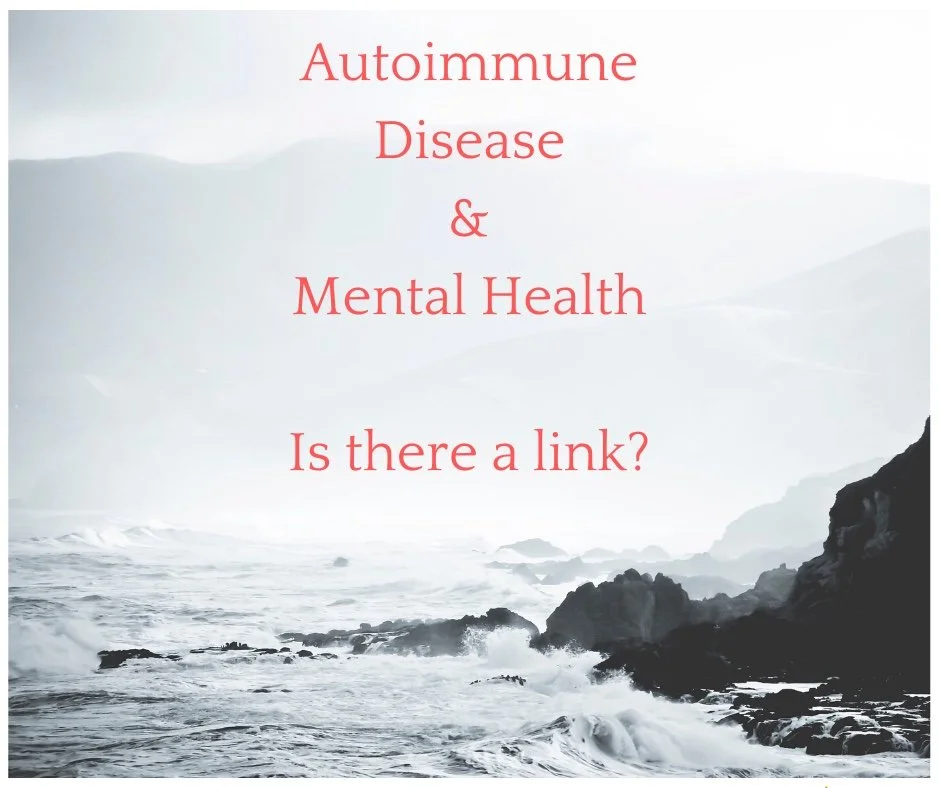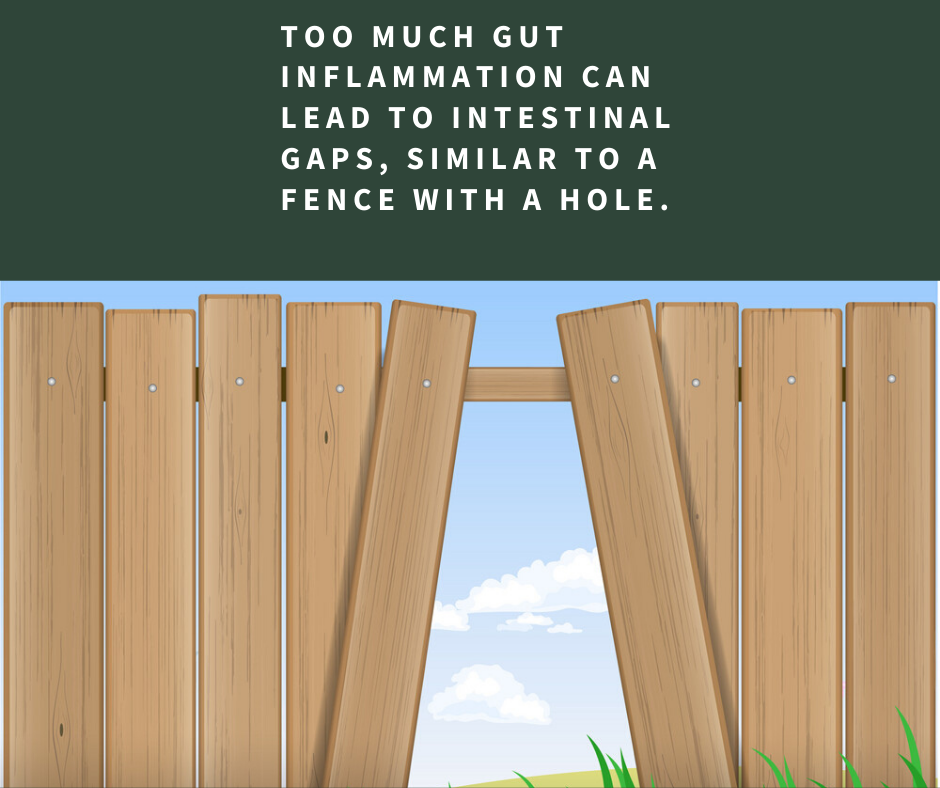What is the link between autoimmune disease and mental health?
Contrary to the original model that all neurotransmitters are made in the brain, many neurotransmitters that control emotions are created via the microbiome. Ninety percent of the neurotransmitter serotonin, which regulates our sense of well-being and lowers anxiety, comes from the digestive tract.
However, for individuals contending with autoimmune disease, it is likely the messages between the gut and the brain are being hijacked or misinterpreted due to the body being under attack from the immune system. Knowing how crucial communication between the gut and brain is to our immune system and mental health, people dealing with autoimmune issues need to learn how to balance our internal systems and untangle the mixed messages in our bodies.
Over the next three posts, I will dive deeper into how we can use food, probiotics, supplements, and herbs to strengthen the good bacteria in the microbiome in hopes of calming down both the physical and mental autoimmune symptoms to bring peace back to our lives.
In case you missed the first blog post of this series, you can read here about the “what” behind the gut-brain axis' bidirectional communication between the digestive system and the brain. This communication has huge impacts on mental health and physical autoimmune flare-ups.
It is essential to understand what is happening in the body when these flare-ups occur so that we can calm the flames. In the second post of this series, we will look more closely at the links between body and mind and how food and therapeutic options can help alleviate these symptoms.
The how: break down in the gut
If the constant circle of messages between the gut and brain is flawed, the circle can deteriorate and perpetuate misinformation and chaos. This can result in debilitating physical and mental symptoms.
With 90% of the serotonin created in the gut, healing the gut is an important place to start in relieving autoimmune-related depression. One problem often found in individuals with these symptoms is a lack of diversity of microbial life in the microbiome. Specifically, there can be fewer strains of probiotics that produce serotonin.
Break down in the mind.
While focusing on healing the gut, you should also ensure you are tending to your mental health. Common factors that can lead to mental health issues for people who are dealing with autoimmune conditions can include:
The diagnosis itself
Past trauma events
Leaky gut
1. The diagnosis
Getting an autoimmune diagnosis can be devastating news. Regardless of the possible treatments available, you soon realize that life will not be the same again.
There is a loss of the sense of self.
Another issue is that our loved ones may be unaware of the seriousness of an autoimmune diagnosis and how deeply it may affect our lives. While well-meaning, people, even our family and friends, can say things that can be unhelpful or even hurtful as we start on our healing path.
To make matters worse, we may shy away from joining autoimmune help groups. Finding online and/or in-person groups for people with our disorder is crucial to avoiding the isolating feeling. Another important option is obtaining the help of a mental health counselor.
Holistic health care incorporates the physical, mental, spiritual, social, and intellectual elements of one’s being. For that to happen, it involves teams of experts. Do not be ashamed to add support groups and mental health professionals to your team to find the hope and connection we all need.
2. The link between past trauma and autoimmune disorders
Researchers have observed that an individual who has had a significant traumatic event in their childhood is at least 70% more likely to develop an autoimmune disorder.
In one study of 8,295 women and 7,064 men, researchers studied the possible correlation between patients hospitalized due to autoimmune conditions and whether these patients had experienced two or more adverse childhood events (ACEs). The results were astounding.
Of those participants who had two or more ACEs:
Seventy percent had an autoimmune situation with a Th1-mediated disease. These are organ-specific diseases like multiple sclerosis or irritable bowel disorder.
Eighty percent had an autoimmune condition with a Th2-mediated disease. These are systemic diseases like lupus or Sjorgens.
One hundred percent had an increased risk for rheumatoid disorders.
Unhealed trauma alone can explain depression symptoms. Add a chronic disease with a dire prognosis (at least where conventional medicine is concerned), and it is no surprise that autoimmunity and depression are so closely interlinked.
Therapeutic approaches to emotional healing
When dealing with an illness that affects our bodies and our brains, it is important to consider healing approaches that can help our physical and mental symptoms as well.
Two therapies successfully address emotional healing: Cognitive Behavior Therapy and Eye Movement Desensitization and Reprocessing (EMDR).
In Cognitive Behavior Therapy, one learns to
first, identify automatic thoughts and assumptions that arise, and then
to distinguish between facts and irrational thoughts.
EMDR is a processing technique that believes that a trauma event gets compartmentalized in the brain where the person is unable to process the negative emotions that surround that event. The unpleasant memory is broken down into manageable parts through eye movements brought about by blinking lights or hand-held buzzers. The client focuses on the event and physical sensations associated with accessing this memory while tracking eyes back and forth. This breakdown procedure allows both sides of the brain to process and create new associative links for the trauma event, ideally leading to physical and emotional healing.
Exploring these therapies, along with joining support groups and meeting with mental health professionals, can feel like an unrelated necessity for a physical autoimmune condition. But the gut-brain axis explains how committing to healing past trauma is a crucial step for physical healing as well.
3. The link between leaky gut and autoimmune disorders
Individuals with autoimmune conditions are more susceptible to leaky gut, a condition directly linked to both gut and mental health.
A leaky gut occurs when the intestinal cells have unwanted gaps between them. This can come from poor diet, stress, and medications. These gaps allow particles out of the intestines and into the blood that aren’t supposed to be there. Like having a gap in your neighbor’s fence, their dog comes over, poops in your yard, and leaves you with a mess to deal with.
When food and toxin particles escape through the gaps in our intestinal cells, the immune system attacks them as unwanted foreign invaders. This leads to inflammation and often causes future autoimmune-related physical symptoms.
Inflammation of the GI tract places stress on the microbiome through the escape of cytokines and neurotransmitters. Cytokines are protein molecules that help the body’s immune system. Neurotransmitters are the chemical messaging system from the brain to the body. The circle of messages between the gut and brain must be working correctly.
But when intestinal permeability (the fancy term for leaky gut) increases, cytokines and neurotransmitters move outside the intestines to the wrong side of the gate. Once outside, these rogue molecules-brain barrier, sending the wrong message to the cross the blood recipient. This combines the physical symptoms of autoimmunity with the often-linked mental health issues.
To eliminate this mess, you’ll need to patch up the hole in the fence, so the dog stays where he’s supposed to be.
While this whole thing sounds scary, there is good news: this cycle can be broken! The fence CAN be mended.
Foods that help heal a leaky gut
A diet that supports decreasing inflammation is crucial for autoimmune conditions.
This usually entails a whole foods-based diet focused on the following:
Vegetables (6-10 servings per day, half of those being dark leafy greens)
Fruit (whole, not juiced)
Clean sources of protein: organic, pastured eggs, beef, chicken, and fish
Cultured foods: sauerkraut, kimchi, and tempeh (found in the refrigerated section of grocery stores)
Cultured dairy: kefir and yogurt (plain and sugar-free); dairy-free options are regularly available as well)
Beverages: Tea and bone broth are great additions to calm inflammation and support the microbiome. Bone broth contains glutamine that helps heal the mucosal lining in the gut.
Foods to avoid with leaky gut
Just as it’s important to add certain nutrient-dense foods to the diet, it is equally important to eliminate other foods that can cause inflammation, harm healthy gut bacteria, or encourage the growth of unhealthy bacteria.
These include:
Gluten-containing food, including baked goods (remember, just because something says “gluten-free” on it does not make it a health food; read the ingredients)
Refined oils
Artificial sweeteners
These inflammatory foods negatively impact good bacteria but are typical offenders for triggering varying digestive issues.
What is fabulous in making this shift in dietary habits is that these foods also help support mental health. So, in giving up the inflammatory foods and adding in nutrient-dense whole foods, you will be addressing both sides of the gut-brain axis at the same time! Double-whammy!
In the next blog, I will discuss probiotics and how they can alleviate both physical and mental autoimmune symptoms.



